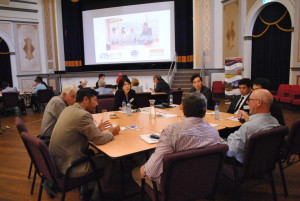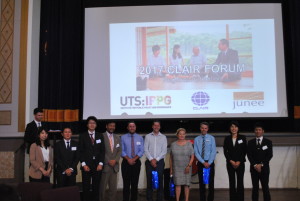2017年2月22日(水)、2017年クレアフォーラムを開催しました。
テーマ「地方創生」
会場 ジュニー アセニアムシアター
(Junee Athenium Theatre)
主催 クレアシドニー事務所
共催 シドニー工科大学公共政策研究所
(Institute for Public Policy and Governance, University of Technology, Sydney)
協力 ジュニーシャイアー
(Junee Shire)
今年のフォーラムは、シドニー工科大学大学公共政策研究所のRoberta Ryan所長の進行のもと、開催地に隣接しニューサウスウェールズ州・ワガワガ市職員のMatthew Holt氏と同大学のLee Pugalis教授をお招きし、当事務所員の5名も加わり事例紹介及び意見交換を行いました。
冒頭、吉見次長が開会のあいさつの中で、「日本では戦後、劇的に人口が増加したが、人口の都市部への集中と地方の高齢化が進んでおり、問題となっている。オーストラリアでも若者の都市部への集中が問題なっており、地域の活性化は両国にとって共通の課題である。今回のテーマは地方創生であり地域開催に適したものである。日本における国、都道府県、市町村といった3段階の自治体レベルでの事例を紹介しながら、地方の活性化等について共に議論をしていきたい」と説明しました。
次に進行者のRoberta Ryan所長からも、この課題への対策として、具体的かつ実効的な事例が発表されることを期待し、皆さんで討論していきたいと述べられました。
開催地であるJunee Shireを代表してRobin Asmus議員からも今日のフォーラムが各自治体の課題解決に寄与するような有意義なものとしてほしい旨の挨拶がありました。
その後、吉見次長から現在のオーストラリアと日本における地方自治制度の仕組みや国・県・市町村の財政状況の違いついての紹介がなされ、事例紹介が始まりました。
セッション 1
「オーストラリアにおける地域活性化施策」
まず、Lee Pugalis教授からオーストラリアにおける地域活性化施策の概要と共に、特定地域への財源の集中についての説明がなされました。オーストラリアでは、連邦政府と州政府、地方自治体の協議によって、潜在的に成長が見込まれる地域に対して、財源を集中させ発展させる仕組みが取られているとのことです。
「東京⇔夕張 自治体間連携モデル事業」
小松所長補佐(東京都派遣)は、都と夕張市で行われている自治体間連携モデル事業について発表しました。2007年の夕張市財政破綻以降の東京都からの職員派遣、アーティスト派遣、都バスの無償提供や、高校生の相互交流など、オーストラリアで自治体間連携を行う際に参考に出来る事例を提供しました。
「地域おこし協力隊」
鈴木所長補佐(北海道庁派遣)からは、日本政府の地域活性化政策の一つである「地域おこし協力隊」について、制度の概要及び北海道の由仁町(移住促進)と陸別町(地元食材を使った特産品のブランド化)の事例について紹介がなされました。
セッション 2
「evocitiesの2010~2016年までの取り組み」
Matthew Holt氏はevocitiesの活動を紹介しました。evocitiesは、ニューサウスウェールズ州の6地方都市(Albury, Armidale, Bathurst, Dubbo, Tamworth and Wagga Wagga)が共同で行っているキャンペーンで、都市部のシドニー市の住民に対して、地方への移住を目的とする取り組みです。
7年間の間で2,900世帯の移住がなされています。今後は、他の地方都市にも提携先を増やしていき、影響力を強めていきたいとのことです。
「六戸町における定住支援施策」
川村所長補佐(青森県六戸町派遣)は町が実施している3つの定住支援施策について紹介しました。1つ目は町内に住む子どもの医療費が無償となる制度、2つ目は若者世帯が町で賃貸住宅を借りる際に家賃の一部を補助制度、3つ目は、町に新たに住宅を購入する際に一部費用補助する制度です。そして最後に、これらの施策の効果について言及し発表のまとめとしました。
「自治体と大学との連携」
岡元所長補佐(京都府井出町派遣)からは、人口減少対策の一環として取り組んでいる派遣元自治体の事例を基に、地域と大学との連携による地域活性化をテーマに発表を行われました。現在の町が抱える課題、課題に向けた取り組み、活動事例、今後の方向性等が紹介されたほか、多様な主体との連携による可能性について意見交換が行われました。
「ふるさと納税」
島田所長補佐(神戸市派遣)は、ふるさと納税について、税収入の地域間格差を解消し地方創成を行う施策として紹介しました。
制度の内容に加え、制度の導入背景、寄付件数・金額の推移、今後の課題について説明するとともに、ふるさと税の活用事例として、東北大震災からの復興費としての利用について紹介しました。
それぞれのセッションの後半には、それぞれのテーマについて、ワークショップ形式での意見交換を行いました。近隣自治体幹部や議員、研究者らをはじめとする参加者からは日豪両国の地方部が抱える課題などに関連した質問や意見が出されました。今後も豪州の自治体・大学等との有益な情報交換を継続していきます。


